反海外腐败法---译本
- 格式:docx
- 大小:3.41 MB
- 文档页数:7
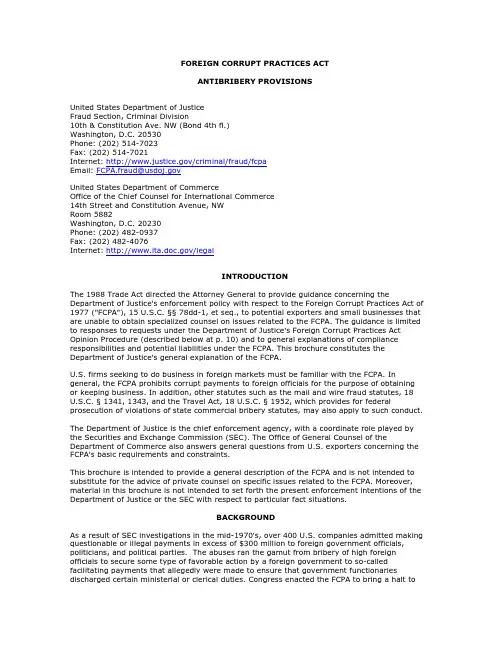
FOREIGN CORRUPT PRACTICES ACTANTIBRIBERY PROVISIONSUnited States Department of JusticeFraud Section, Criminal Division10th & Constitution Ave. NW (Bond 4th fl.)Washington, D.C. 20530Phone: (202) 514-7023Fax: (202) 514-7021Internet: /criminal/fraud/fcpaEmail: FCPA.fraud@United States Department of CommerceOffice of the Chief Counsel for International Commerce14th Street and Constitution Avenue, NWRoom 5882Washington, D.C. 20230Phone: (202) 482-0937Fax: (202) 482-4076Internet: /legalINTRODUCTIONThe 1988 Trade Act directed the Attorney General to provide guidance concerning the Department of Justice's enforcement policy with respect to the Foreign Corrupt Practices Act of 1977 ("FCPA"), 15 U.S.C. §§ 78dd-1, et seq., to potential exporters and small businesses that are unable to obtain specialized counsel on issues related to the FCPA. The guidance is limited to responses to requests under the Department of Justice's Foreign Corrupt Practices Act Opinion Procedure (described below at p. 10) and to general explanations of compliance responsibilities and potential liabilities under the FCPA. This brochure constitutes the Department of Justice's general explanation of the FCPA.U.S. firms seeking to do business in foreign markets must be familiar with the FCPA. In general, the FCPA prohibits corrupt payments to foreign officials for the purpose of obtaining or keeping business. In addition, other statutes such as the mail and wire fraud statutes, 18 U.S.C. § 1341, 1343, and the Travel Act, 18 U.S.C. § 1952, which provides for federal prosecution of violations of state commercial bribery statutes, may also apply to such conduct.The Department of Justice is the chief enforcement agency, with a coordinate role played by the Securities and Exchange Commission (SEC). The Office of General Counsel of the Department of Commerce also answers general questions from U.S. exporters concerning the FCPA's basic requirements and constraints.This brochure is intended to provide a general description of the FCPA and is not intended to substitute for the advice of private counsel on specific issues related to the FCPA. Moreover, material in this brochure is not intended to set forth the present enforcement intentions of the Department of Justice or the SEC with respect to particular fact situations.BACKGROUNDAs a result of SEC investigations in the mid-1970's, over 400 U.S. companies admitted making questionable or illegal payments in excess of $300 million to foreign government officials, politicians, and political parties. The abuses ran the gamut from bribery of high foreign officials to secure some type of favorable action by a foreign government to so-called facilitating payments that allegedly were made to ensure that government functionaries discharged certain ministerial or clerical duties. Congress enacted the FCPA to bring a halt tothe bribery of foreign officials and to restore public confidence in the integrity of the American business system.The FCPA was intended to have and has had an enormous impact on the way American firms do business. Several firms that paid bribes to foreign officials have been the subject of criminal and civil enforcement actions, resulting in large fines and suspension and debarment from federal procurement contracting, and their employees and officers have gone to jail. To avoid such consequences, many firms have implemented detailed compliance programs intended to prevent and to detect any improper payments by employees and agents. Following the passage of the FCPA, the Congress became concerned that American companies were operating at a disadvantage compared to foreign companies who routinely paid bribes and, in some countries, were permitted to deduct the cost of such bribes as business expenses on their taxes. Accordingly, in 1988, the Congress directed the Executive Branch to commence negotiations in the Organization of Economic Cooperation and Development (OECD) to obtain the agreement of the United States' major trading partners to enact legislation similar to the FCPA. In 1997, almost ten years later, the United States and thirty-three other countries signed the OECD Convention on Combating Bribery of Foreign Public Officials in International Business Transactions. The United States ratified this Convention and enacted implementing legislation in 1998. See Convention and Commentaries on the DOJ web site.The anti-bribery provisions of the FCPA make it unlawful for a U.S. person, and certain foreign issuers of securities, to make a corrupt payment to a foreign official for the purpose of obtaining or retaining business for or with, or directing business to, any person. Since 1998, they also apply to foreign firms and persons who take any act in furtherance of such a corrupt payment while in the United States.The FCPA also requires companies whose securities are listed in the United States to meet its accounting provisions. See 15 U.S.C. § 78m. These accounting provisions, which were designed to operate in tandem with the anti-bribery provisions of the FCPA, require corporations covered by the provisions to make and keep books and records that accurately and fairly reflect the transactions of the corporation and to devise and maintain an adequate system of internal accounting controls. This brochure discusses only the anti-bribery provisions.ENFORCEMENTThe Department of Justice is responsible for all criminal enforcement and for civil enforcement of the anti-bribery provisions with respect to domestic concerns and foreign companies and nationals. The SEC is responsible for civil enforcement of the anti-bribery provisions with respect to issuers.ANTIBRIBERY PROVISIONSBASIC PROHIBITIONThe FCPA makes it unlawful to bribe foreign government officials to obtain or retain business. With respect to the basic prohibition, there are five elements which must be met to constitute a violation of the Act:A. Who -- The FCPA potentially applies to any individual, firm, officer, director, employee, or agent of a firm and any stockholder acting on behalf of a firm. Individuals and firms may also be penalized if they order, authorize, or assist someone else to violate the anti-bribery provisions or if they conspire to violate those provisions.Under the FCPA, U.S. jurisdiction over corrupt payments to foreign officials depends upon whether the violator is an "issuer," a "domestic concern," or a foreign national or business.An "issuer" is a corporation that has issued securities that have been registered in the United States or who is required to file periodic reports with the SEC. A "domestic concern" is any individual who is a citizen, national, or resident of the United States, or any corporation, partnership, association, joint-stock company, business trust, unincorporated organization, or sole proprietorship which has its principal place of business in the United States, or which is organized under the laws of a State of the United States, or a territory, possession, or commonwealth of the United States.Issuers and domestic concerns may be held liable under the FCPA under either territorial or nationality jurisdiction principles. For acts taken within the territory of the United States, issuers and domestic concerns are liable if they take an act in furtherance of a corrupt payment to a foreign official using the U.S. mails or other means or instrumentalities of interstate commerce. Such means or instrumentalities include telephone calls, facsimile transmissions, wire transfers, and interstate or international travel. In addition, issuers and domestic concerns may be held liable for any act in furtherance of a corrupt payment taken outside the United States. Thus, a U.S. company or national may be held liable for a corrupt payment authorized by employees or agents operating entirely outside the United States, using money from foreign bank accounts, and without any involvement by personnel located within the United States.Prior to 1998, foreign companies, with the exception of those who qualified as "issuers," and foreign nationals were not covered by the FCPA. The 1998 amendments expanded the FCPA to assert territorial jurisdiction over foreign companies and nationals. A foreign company or person is now subject to the FCPA if it causes, directly or through agents, an act infurtherance of the corrupt payment to take place within the territory of the United States. There is, however, no requirement that such act make use of the U.S. mails or other means or instrumentalities of interstate commerce.Finally, U.S. parent corporations may be held liable for the acts of foreign subsidiaries where they authorized, directed, or controlled the activity in question, as can U.S. citizens or residents, themselves "domestic concerns," who were employed by or acting on behalf of such foreign-incorporated subsidiaries.B. Corrupt intent -- The person making or authorizing the payment must have a corrupt intent, and the payment must be intended to induce the recipient to misuse his official position to direct business wrongfully to the payer or to any other person. You should note that the FCPA does not require that a corrupt act succeed in its purpose. The offer or promise of a corrupt payment can constitute a violation of the statute. The FCPA prohibits any corrupt payment intended to influence any act or decision of a foreign official in his or her official capacity, to induce the official to do or omit to do any act in violation of his or her lawful duty, to obtain any improper advantage, or to induce a foreign official to use his or her influence improperly to affect or influence any act or decision.C. Payment -- The FCPA prohibits paying, offering, promising to pay (or authorizing to pay or offer) money or anything of value.D. Recipient -- The prohibition extends only to corrupt payments to a foreign official, a foreign political party or party official, or any candidate for foreign political office. A "foreign official" means any officer or employee of a foreign government, a public international organization, or any department or agency thereof, or any person acting in an official capacity. You should consider utilizing the Department of Justice's Foreign Corrupt Practices Act Opinion Procedure for particular questions as to the definition of a "foreign official," such as whether a member of a royal family, a member of a legislative body, or an official of astate-owned business enterprise would be considered a "foreign official."The FCPA applies to payments to any public official, regardless of rank or position. The FCPA focuses on the purpose of the payment instead of the particular duties of the official receiving the payment, offer, or promise of payment, and there are exceptions to the anti-bribery provision for "facilitating payments for routine governmental action" (see below).E. Business Purpose Test -- The FCPA prohibits payments made in order to assist the firm in obtaining or retaining business for or with, or directing business to, any person. The Department of Justice interprets "obtaining or retaining business" broadly, such that the term encompasses more than the mere award or renewal of a contract. It should be noted that the business to be obtained or retained does not need to be with a foreign government or foreign government instrumentality.THIRD PARTY PAYMENTSThe FCPA prohibits corrupt payments through intermediaries. It is unlawful to make apayment to a third party, while knowing that all or a portion of the payment will go directly or indirectly to a foreign official. The term "knowing" includes conscious disregard and deliberate ignorance. The elements of an offense are essentially the same as described above, except that in this case the "recipient" is the intermediary who is making the payment to the requisite "foreign official."Intermediaries may include joint venture partners or agents. To avoid being held liable for corrupt third party payments, U.S. companies are encouraged to exercise due diligence and to take all necessary precautions to ensure that they have formed a business relationship with reputable and qualified partners and representatives. Such due diligence may include investigating potential foreign representatives and joint venture partners to determine if they are in fact qualified for the position, whether they have personal or professional ties to the government, the number and reputation of their clientele, and their reputation with the U.S. Embassy or Consulate and with local bankers, clients, and other business associates. In addition, in negotiating a business relationship, the U.S. firm should be aware of so-called "red flags," i.e., unusual payment patterns or financial arrangements, a history of corruption in the country, a refusal by the foreign joint venture partner or representative to provide a certification that it will not take any action in furtherance of an unlawful offer, promise, or payment to a foreign public official and not take any act that would cause the U.S. firm to be in violation of the FCPA, unusually high commissions, lack of transparency in expenses and accounting records, apparent lack of qualifications or resources on the part of the joint venture partner or representative to perform the services offered, and whether the joint venture partner or representative has been recommended by an official of the potential governmental customer.You should seek the advice of counsel and consider utilizing the Department of Justice's Foreign Corrupt Practices Act Opinion Procedure for particular questions relating to third party payments.PERMISSIBLE PAYMENTS AND AFFIRMATIVE DEFENSESThe FCPA contains an explicit exception to the bribery prohibition for "facilitating payments"for "routine governmental action" and provides affirmative defenses which can be used to defend against alleged violations of the FCPA.FACILITATING PAYMENTS FOR ROUTINE GOVERNMENTAL ACTIONSThere is an exception to the anti-bribery prohibition for payments to facilitate or expedite performance of a "routine governmental action." The statute lists the following examples: obtaining permits, licenses, or other official documents; processing governmental papers, such as visas and work orders; providing police protection, mail pick-up and delivery; providing phone service, power and water supply, loading and unloading cargo, or protecting perishable products; and scheduling inspections associated with contract performance or transit of goods across country.Actions "similar" to these are also covered by this exception. If you have a question about whether a payment falls within the exception, you should consult with counsel. You shouldalso consider whether to utilize the Justice Department's Foreign Corrupt Practices Opinion Procedure, described below on p. 10."Routine governmental action" does not include any decision by a foreign official to award new business or to continue business with a particular party.AFFIRMATIVE DEFENSESA person charged with a violation of the FCPA's anti-bribery provisions may assert as a defense that the payment was lawful under the written laws of the foreign country or that the money was spent as part of demonstrating a product or performing a contractual obligation. Whether a payment was lawful under the written laws of the foreign country may be difficultto determine. You should consider seeking the advice of counsel or utilizing the Department of Justice's Foreign Corrupt Practices Act Opinion Procedure when faced with an issue of the legality of such a payment.Moreover, because these defenses are "affirmative defenses," the defendant is required to show in the first instance that the payment met these requirements. The prosecution does not bear the burden of demonstrating in the first instance that the payments did not constitutethis type of payment.SANCTIONS AGAINST BRIBERYCRIMINALThe following criminal penalties may be imposed for violations of the FCPA's anti-bribery provisions: corporations and other business entities are subject to a fine of up to $2,000,000; officers, directors, stockholders, employees, and agents are subject to a fine of up to$100,000 and imprisonment for up to five years. Moreover, under the Alternative Fines Act, these fines may be actually quite higher -- the actual fine may be up to twice the benefit that the defendant sought to obtain by making the corrupt payment. You should also be aware that fines imposed on individuals may not be paid by their employer or principal.CIVILThe Attorney General or the SEC, as appropriate, may bring a civil action for a fine of up to $10,000 against any firm as well as any officer, director, employee, or agent of a firm, or stockholder acting on behalf of the firm, who violates the anti-bribery provisions. In addition, in an SEC enforcement action, the court may impose an additional fine not to exceed the greater of (i) the gross amount of the pecuniary gain to the defendant as a result of the violation, or (ii) a specified dollar limitation. The specified dollar limitations are based on the egregiousness of the violation, ranging from $5,000 to $100,000 for a natural person and $50,000 to $500,000 for any other person.The Attorney General or the SEC, as appropriate, may also bring a civil action to enjoin anyact or practice of a firm whenever it appears that the firm (or an officer, director, employee, agent, or stockholder acting on behalf of the firm) is in violation (or about to be) of the anti-bribery provisions.OTHER GOVERNMENTAL ACTIONUnder guidelines issued by the Office of Management and Budget, a person or firm found in violation of the FCPA may be barred from doing business with the Federal government. Indictment alone can lead to suspension of the right to do business with the government. The President has directed that no executive agency shall allow any party to participate in any procurement or non-procurement activity if any agency has debarred, suspended, or otherwise excluded that party from participation in a procurement or non-procurement activity.In addition, a person or firm found guilty of violating the FCPA may be ruled ineligible to receive export licenses; the SEC may suspend or bar persons from the securities business and impose civil penalties on persons in the securities business for violations of the FCPA; the Commodity Futures Trading Commission and the Overseas Private Investment Corporation both provide for possible suspension or debarment from agency programs for violation of the FCPA; and a payment made to a foreign government official that is unlawful under the FCPA cannot be deducted under the tax laws as a business expense.PRIVATE CAUSE OF ACTIONConduct that violates the anti-bribery provisions of the FCPA may also give rise to a private cause of action for treble damages under the Racketeer Influenced and Corrupt Organizations Act (RICO), or to actions under other federal or state laws. For example, an action might be brought under RICO by a competitor who alleges that the bribery led to the defendant winning a foreign contract.GUIDANCE FROM THE GOVERNMENTThe Department of Justice has established a Foreign Corrupt Practices Act Opinion Procedure by which any U.S. company or national may request a statement of the Justice Department's present enforcement intentions under the anti-bribery provisions of the FCPA regarding any proposed business conduct. The details of the opinion procedure may be found at 28 CFR Part 80. Under this procedure, the Attorney General will issue an opinion in response to a specific inquiry from a person or firm within thirty days of the request. (The thirty-day period does not begin to run until the Department of Justice has received all the information it requires to issue the opinion.) Conduct for which the Department of Justice has issued an opinion stating that the conduct conforms with current enforcement policy will be entitled to a presumption, in any subsequent enforcement action, of conformity with the FCPA. Copies of releases issued regarding previous opinions are available on the Department of Justice's FCPA web site.For further information from the Department of Justice about the FCPA and the Foreign Corrupt Practices Act Opinion Procedure, contact Charles Duross, Acting Deputy Chief, Fraud Section, at (202) 353-7691; or Nathaniel Edmonds, Assistant Chief, Fraud Section, at (202) 307-0629; or William Stuckwisch, Acting Assistant Chief, Fraud Section, at (202) 353-2393. Although the Department of Commerce has no enforcement role with respect to the FCPA, it supplies general guidance to U.S. exporters who have questions about the FCPA and about international developments concerning the FCPA. For further information from the Department of Commerce about the FCPA contact Eleanor Roberts Lewis, Chief Counsel for International Commerce, or Arthur Aronoff, Senior Counsel, Office of the Chief Counsel for International Commerce, U.S. Department of Commerce, Room 5882, 14th Street and Constitution Avenue, N.W., Washington, D.C. 20230, (202) 482-0937.。
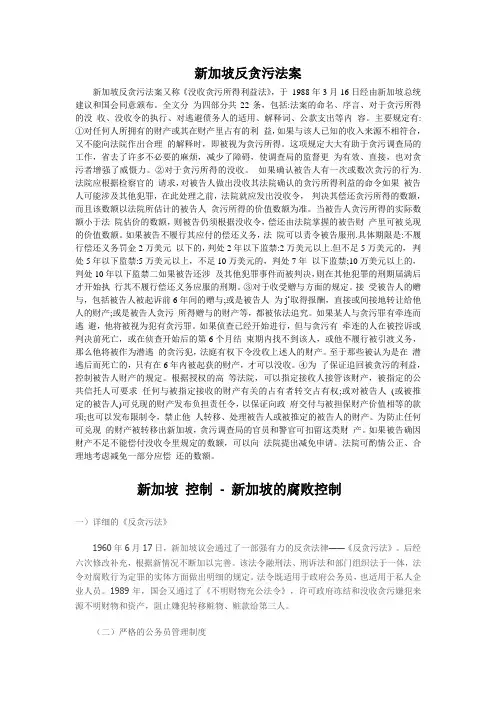
新加坡反贪污法案新加坡反贪污法案又称《没收贪污所得利益法》,于1988年3月16日经由新加坡总统建议和国会同意颁布。
全文分为四部分共22条,包括:法案的命名、序言、对于贪污所得的没收、没收令的执行、对逃避债务人的适用、解释词、公款支出等内容。
主要规定有:①对任何人所拥有的财产或其在财产里占有的利益,如果与该人已知的收入来源不相符合,又不能向法院作出合理的解释时,即被视为贪污所得。
这项规定大大有助于贪污调查局的工作,省去了许多不必要的麻烦,减少了障碍,使调查局的监督更为有效、直接,也对贪污者增强了威慑力。
②对于贪污所得的没收。
如果确认被告人有一次或数次贪污的行为.法院应根据检察官的请求,对被告人做出没收其法院确认的贪污所得利益的命令如果被告人可能涉及其他犯罪,在此处理之前,法院就应发出没收令,判决其偿还贪污所得的数额,而且该数额以法院所估计的被告人贪污所得的价值数额为准。
当被告人贪污所得的实际数额小于法院估价的数额,则被告仍须根据没收令,偿还由法院掌握的被告财产里可被兑现的价值数额。
如果被告不履行其应付的偿还义务,法院可以责令被告服刑.具体期限是:不履行偿还义务罚金2万美元以下的,判处2年以下监禁:2万美元以上.但不足5万美元的,判处5年以下监禁:5万美元以上,不足10万美元的,判处7年以下监禁;10万美元以上的,判处10年以下监禁二如果被告还涉及其他犯罪事件而被判决,则在其他犯罪的刑期届满后才开始执行其不履行偿还义务应服的刑期。
③对于收受赠与方面的规定。
接受被告人的赠与,包括被告人被起诉前6年间的赠与;或是被告人为j‘取得报酬,直接或间接地转让给他人的财产;或是被告人贪污所得赠与的财产等,都被依法追究。
如果某人与贪污罪有牵连而逃避,他将被视为犯有贪污罪。
如果侦查已经开始进行,但与贪污有牵连的人在被控诉或判决前死亡,或在侦查开始后的第6个月结束期内找不到该人,或他不履行被引渡义务,那么他将被作为潜逃的贪污犯,法庭有权下令没收上述人的财产。
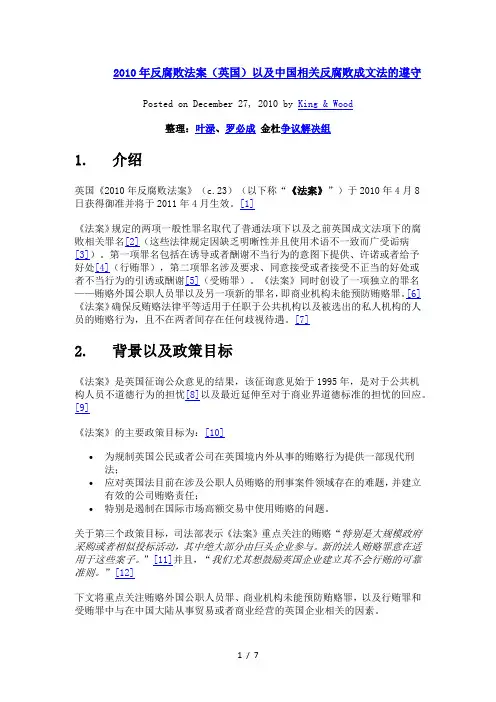
2010年反腐败法案(英国)以及中国相关反腐败成文法的遵守Posted on December 27, 2010 by King & Wood整理:叶渌、罗必成金杜争议解决组1. 介绍英国《2010年反腐败法案》(c.23)(以下称“《法案》”)于2010年4月8日获得御准并将于2011年4月生效。
[1]《法案》规定的两项一般性罪名取代了普通法项下以及之前英国成文法项下的腐败相关罪名[2](这些法律规定因缺乏明晰性并且使用术语不一致而广受诟病[3])。
第一项罪名包括在诱导或者酬谢不当行为的意图下提供、许诺或者给予好处[4](行贿罪),第二项罪名涉及要求、同意接受或者接受不正当的好处或者不当行为的引诱或酬谢[5](受贿罪)。
《法案》同时创设了一项独立的罪名——贿赂外国公职人员罪以及另一项新的罪名,即商业机构未能预防贿赂罪。
[6]《法案》确保反贿赂法律平等适用于任职于公共机构以及被选出的私人机构的人员的贿赂行为,且不在两者间存在任何歧视待遇。
[7]2. 背景以及政策目标《法案》是英国征询公众意见的结果,该征询意见始于1995年,是对于公共机构人员不道德行为的担忧[8]以及最近延伸至对于商业界道德标准的担忧的回应。
[9]《法案》的主要政策目标为:[10]•为规制英国公民或者公司在英国境内外从事的贿赂行为提供一部现代刑法;•应对英国法目前在涉及公职人员贿赂的刑事案件领域存在的难题,并建立有效的公司贿赂责任;•特别是遏制在国际市场高额交易中使用贿赂的问题。
关于第三个政策目标,司法部表示《法案》重点关注的贿赂“特别是大规模政府采购或者相似投标活动,其中绝大部分由巨头企业参与。
新的法人贿赂罪意在适用于这些案子。
”[11]并且,“我们尤其想鼓励英国企业建立其不会行贿的可靠准则。
”[12]下文将重点关注贿赂外国公职人员罪、商业机构未能预防贿赂罪,以及行贿罪和受贿罪中与在中国大陆从事贸易或者商业经营的英国企业相关的因素。
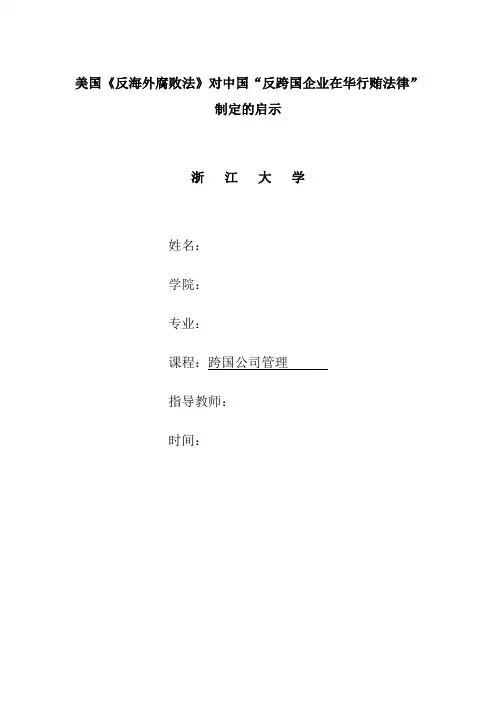
美国《反海外腐败法》对中国“反跨国企业在华行贿法律”制定的启示浙江大学姓名:学院:专业:课程:跨国公司管理指导教师:时间:【摘要】全球经济一体化趋势日益明朗,跨过公司逐渐成为国际商事主导力量之一。
同时,跨国公司在华行贿问题也日益凸显,严重影响着中国在国际社会上的形象与地位,危害着全球良好商业环境的形成。
法制的缺失与软弱是跨国公司在华行贿的根源以及解决该问题根本的切入点,然而美国的《反海外腐败法》在治理商业贿赂中取得较好的成果,对我国“反跨国企业在华行贿法律”的制定具有很大的借鉴意义。
本文,笔者通过对《反海外腐败法》进行大致的解读,汲取其可借之处,结合现有的实际情况对我国治理跨国公司在华行贿这一问题提出可实施的具体建议与措施。
【关键词】跨国公司、商业贿赂、《反海外腐败法》、法制法规,启示1. 背景与现状 (4)2. 美国《反海外腐败法》概述 (5)2.1.1 基本禁令 (5)2.1.2 第三方支付 (5)2.1.3 抗辩 (5)2.1.4法律制裁 (6)2.1.5合法的情况 (6)3.《反海外腐败法》对我国“反跨国企业在华行贿法律”制定的启示 (7)3.1 进一步重视对“跨国商业贿赂”的治理 (7)3.2严厉打击行贿行为 (7)3.3严格执法和鼓励自首 (7)3.4 商业贿赂治理的若干配套措施 (8)3.5 开展国际合作 (9)4.结语 (10)1.背景与现状随着中国参与经济全球一体化进程日益加深,国际跨国公司进一步争夺中国市场的竞争不可回避。
而在这激烈竞争的商业环境中,跨国公司在华商业贿赂的现象不断滋长。
跨国企业在中国通过各种方式行贿,我国针对商业贿赂的治理虽然早已提上了日程,但该问题仍然很严重。
一份民间经济分析机构安邦集团研究报告显示:跨国企业在华行贿事件一直呈上升趋势,中国在10 年内至少调查了50 万起腐败事件,其中64%与国际贸易和外商有关。
跨国公司在华商业贿赂的频繁发生,已成为中国经济发展的瓶颈。
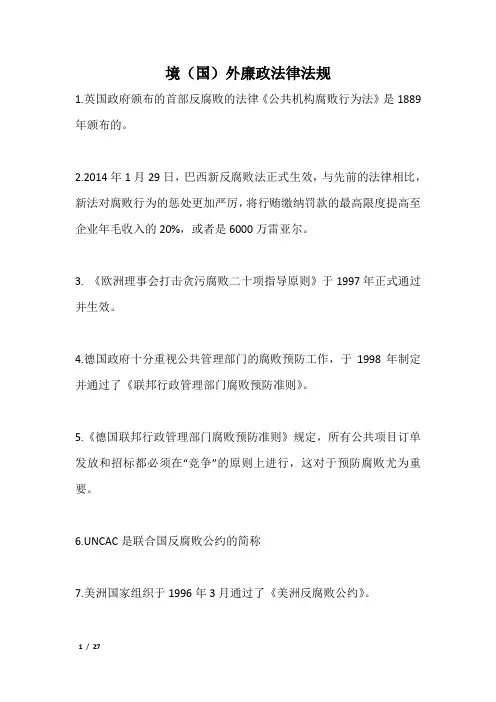
境(国)外廉政法律法规1.英国政府颁布的首部反腐败的法律《公共机构腐败行为法》是1889年颁布的。
2.2014年1月29日,巴西新反腐败法正式生效,与先前的法律相比,新法对腐败行为的惩处更加严厉,将行贿缴纳罚款的最高限度提高至企业年毛收入的20%,或者是6000万雷亚尔。
3. 《欧洲理事会打击贪污腐败二十项指导原则》于1997年正式通过并生效。
4.德国政府十分重视公共管理部门的腐败预防工作,于1998年制定并通过了《联邦行政管理部门腐败预防准则》。
5.《德国联邦行政管理部门腐败预防准则》规定,所有公共项目订单发放和招标都必须在“竞争”的原则上进行,这对于预防腐败尤为重要。
6.UNCAC是联合国反腐败公约的简称7.美洲国家组织于1996年3月通过了《美洲反腐败公约》。
8.《打击涉及欧洲共同体官员或欧洲联盟成员国官员的腐败行为公约》在1997年5月26日通过。
9.《禁止在国际商业交易中贿赂外国公职人员公约》是1997年由经济合作与发展组织通过的。
10.欧洲委员会部长委员会于1999年1月27日通过的《反腐败刑法公约》。
11. 欧洲委员会部长委员会于1999年11月4日通过的《反腐败民法公约》。
12. 《援助非洲全球联盟非洲国家反腐败原则》于1999年获得通过。
13.香港廉政公署的英文简称是ICAC,是根据《廉政公署条例》于1974年2月15日成立的。
14.《美国1977年反海外腐败法》是国际反腐败合作的萌芽,标志着打击腐败行为的范围开始延生到国外。
15.为退订反腐败的国际合作,国际商会于1977年公布了《关于在国际商业交易中反敲诈和贿赂的建议》。
16.第55届联合国大会通过了《U.N. Convention Against Transnational Organized Crime》,其应被翻译为《联合国打击跨国有组织犯罪公约》。
17. 《联合国打击跨国有组织犯罪公约》自2000年12月12日起向成员国开放签署,按照规定,该公约有40个签约国批准通过之后即可生效。
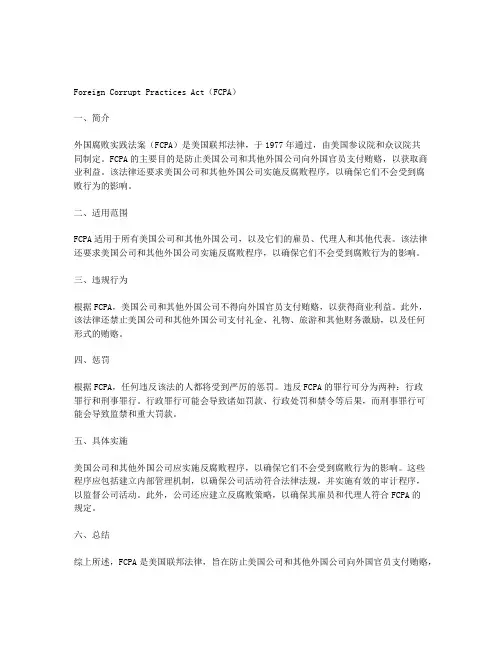
Foreign Corrupt Practices Act(FCPA)一、简介外国腐败实践法案(FCPA)是美国联邦法律,于1977年通过,由美国参议院和众议院共同制定。
FCPA的主要目的是防止美国公司和其他外国公司向外国官员支付贿赂,以获取商业利益。
该法律还要求美国公司和其他外国公司实施反腐败程序,以确保它们不会受到腐败行为的影响。
二、适用范围FCPA适用于所有美国公司和其他外国公司,以及它们的雇员、代理人和其他代表。
该法律还要求美国公司和其他外国公司实施反腐败程序,以确保它们不会受到腐败行为的影响。
三、违规行为根据FCPA,美国公司和其他外国公司不得向外国官员支付贿赂,以获得商业利益。
此外,该法律还禁止美国公司和其他外国公司支付礼金、礼物、旅游和其他财务激励,以及任何形式的贿赂。
四、惩罚根据FCPA,任何违反该法的人都将受到严厉的惩罚。
违反FCPA的罪行可分为两种:行政罪行和刑事罪行。
行政罪行可能会导致诸如罚款、行政处罚和禁令等后果,而刑事罪行可能会导致监禁和重大罚款。
五、具体实施美国公司和其他外国公司应实施反腐败程序,以确保它们不会受到腐败行为的影响。
这些程序应包括建立内部管理机制,以确保公司活动符合法律法规,并实施有效的审计程序,以监督公司活动。
此外,公司还应建立反腐败策略,以确保其雇员和代理人符合FCPA的规定。
六、总结综上所述,FCPA是美国联邦法律,旨在防止美国公司和其他外国公司向外国官员支付贿赂,以获取商业利益。
该法律还要求美国公司和其他外国公司实施反腐败程序,以确保它们不会受到腐败行为的影响。
任何违反FCPA的人都将受到严厉的惩罚。
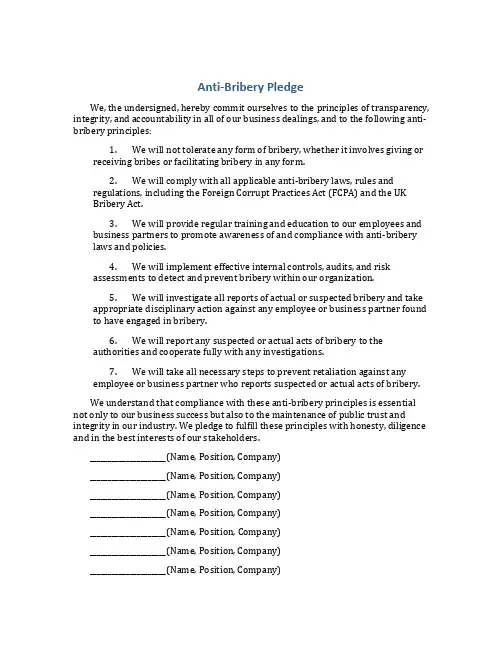
Anti-Bribery PledgeWe, the undersigned, hereby commit ourselves to the principles of transparency, integrity, and accountability in all of our business dealings, and to the following anti-bribery principles:1.We will not tolerate any form of bribery, whether it involves giving orreceiving bribes or facilitating bribery in any form.2.We will comply with all applicable anti-bribery laws, rules andregulations, including the Foreign Corrupt Practices Act (FCPA) and the UKBribery Act.3.We will provide regular training and education to our employees andbusiness partners to promote awareness of and compliance with anti-bribery laws and policies.4.We will implement effective internal controls, audits, and riskassessments to detect and prevent bribery within our organization.5.We will investigate all reports of actual or suspected bribery and takeappropriate disciplinary action against any employee or business partner found to have engaged in bribery.6.We will report any suspected or actual acts of bribery to theauthorities and cooperate fully with any investigations.7.We will take all necessary steps to prevent retaliation against anyemployee or business partner who reports suspected or actual acts of bribery.We understand that compliance with these anti-bribery principles is essential not only to our business success but also to the maintenance of public trust and integrity in our industry. We pledge to fulfill these principles with honesty, diligence and in the best interests of our stakeholders._____________________(Name, Position, Company)_____________________(Name, Position, Company)_____________________(Name, Position, Company)_____________________(Name, Position, Company)_____________________(Name, Position, Company)_____________________(Name, Position, Company)_____________________(Name, Position, Company)。
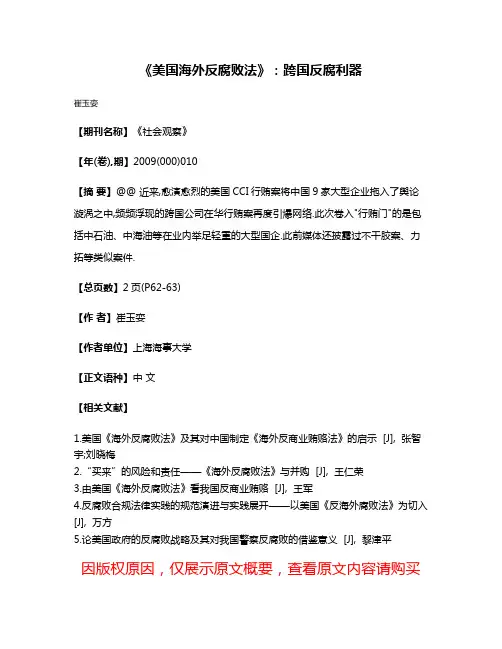
《美国海外反腐败法》:跨国反腐利器
崔玉娈
【期刊名称】《社会观察》
【年(卷),期】2009(000)010
【摘要】@@ 近来,愈演愈烈的美国CCI行贿案将中国9家大型企业拖入了舆论漩涡之中,频频浮现的跨国公司在华行贿案再度引爆网络.此次卷入"行贿门"的是包括中石油、中海油等在业内举足轻重的大型国企.此前媒体还披露过不干胶案、力拓等类似案件.
【总页数】2页(P62-63)
【作者】崔玉娈
【作者单位】上海海事大学
【正文语种】中文
【相关文献】
1.美国《海外反腐败法》及其对中国制定《海外反商业贿赂法》的启示 [J], 张智宇;刘晓梅
2.“买来”的风险和责任——《海外反腐败法》与并购 [J], 王仁荣
3.由美国《海外反腐败法》看我国反商业贿赂 [J], 王军
4.反腐败合规法律实践的规范演进与实践展开——以美国《反海外腐败法》为切入[J], 万方
5.论美国政府的反腐败战略及其对我国警察反腐败的借鉴意义 [J], 黎津平
因版权原因,仅展示原文概要,查看原文内容请购买。

联合国反腐败公约(英文版)2010-09-13United Nations Convention against CorruptionPreambleThe States Parties to this Convention,Concerned about the seriousness of problems and threats posed by corruptionto the stability and security of societies, undermining the institutions and values of democracy, ethical values and justice and jeopardizing sustainable development and the rule of law,Concerned also about the links between corruption and other forms of crime,in particular organized crime and economic crime, including money-laundering, Concerned further about cases of corruption that involve vast quantities of assets, which may constitute a substantial proportion of the resources of States, and that threaten the political stability and sustainable development of those States, Convinced that corruption is no longer a local matter but a transnational phenomenon that affects all societies and economies, making international cooperation to prevent and control it essential,Convinced also that a comprehensive and multidisciplinary approach is required to prevent and combat corruption effectively,Convinced further that the availability of technical assistance can play an important role in enhancing the ability of States, including by strengthening capacity and by institution-building, to prevent and combat corruption effectively, Convinced that the illicit acquisition of personal wealth can be particularly damaging to democratic institutions, national economies and the rule of law, Determined to prevent, detect and deter in a more effective manner international transfers of illicitly acquired assets and to strengthen international cooperation in asset recovery,Acknowledging the fundamental principles of due process of law in criminal proceedings and in civil or administrative proceedings to adjudicate property rights, Bearing in mind that the prevention and eradication of corruption is a responsibility of all States and that they must cooperate with one another, with the support and involvement of individuals and groups outside the public sector, such as civil society, non-governmental organizations and community-based organizations, if their efforts in this area are to be effective,Bearing also in mind the principles of proper management of public affairs and public property, fairness, responsibility and equality before the law and the need to safeguard integrity and to foster a culture of rejection of corruption, Commending the work of the Commission on Crime Prevention and Criminal Justice and the United Nations Office on Drugs and Crime in preventing and combating corruption,2Recalling the work carried out by other international and regionalorganizations in this field, including the activities of the African Union, the Councilof Europe, the Customs Cooperation Council (also known as the World CustomsOrganization), the European Union, the League of Arab States, the Organisation forEconomic Cooperation and Development and the Organization of American States,Taking note with appreciation of multilateral instruments to prevent andcombat corruption, including, inter alia, the Inter-American Convention againstCorruption, adopted by the Organization of American States on 29 March 1996,1 theConvention on the Fight against Corruption involving Officials of the EuropeanCommunities or Officials of Member States of the European Union, adopted by theCouncil of the European Union on 26 May 1997,2 the Convention on CombatingBribery of Foreign Public Officials in International Business Transactions, adoptedby the Organisation for Economic Cooperation and Development on 21 November1997,3 the Criminal Law Convention on Corruption, adopted by the Committee ofMinisters of the Council of Europe on 27 January 1999,4 the Civil Law Conventionon Corruption, adopted by the Committee of Ministers of the Council of Europe on4 November 1999,5 and the African Union Convention on Preventing andCombating Corruption, adopted by the Heads of State and Government of theAfrican Union on 12 July 2003,Welcoming the entry into force on 29 September 2003 of the United NationsConvention against Transnational Organized Crime,6Have agreed as follows:Chapter IGeneral provisionsArticle 1Statement of purposeThe purposes of this Convention are:(a) To promote and strengthen measures to prevent and combat corruptionmore efficiently and effectively;(b) To promote, facilitate and support international cooperation and technicalassistance in the prevention of and fight against corruption, including in assetrecovery;(c) To promote integrity, accountability and proper management of publicaffairs and public property.__________________1 See E/1996/99.2 Official Journal of the European Communities, C 195, 25 June 1997.Corruption and Integrity Improvement Initiatives in Developing Countries3 See(United Nationspublication, Sales No. E.98.III.B.18).European Treaty Series, No. 173.4 Council of Europe,5 Ibid., No. 174.6 General Assembly resolution 55/25, annex I.3Article 2Use of termsFor the purposes of this Convention:(a) “Public official” shall mean: (i) any person holding a legislative,executive, administrative or judicial office of a State Party, whether appointed or elected, whether permanent or temporary, whether paid or unpaid, irrespective of that person’s seniority; (ii) any other person who performs a public function, including for a public agency or public enterprise, or provides a public service, as defined in the domestic law of the State Party and as applied in the pertinent area of law of that State Party; (iii) any other pers on defined as a “public official” in the domestic law of a State Party. However, for the purpose of some specific measures contained in chapter II of this Convention, “public official” may mean any person who performs a public function or provides a public service as defined in the domestic law of the State Party and as applied in the pertinent area of law of that State Party;(b) “Foreign public official” shall mean any person holding a legislative, executive, administrative or judicial office of a foreign country, whether appointed or elected; and any person exercising a public function for a foreign country, including for a public agency or public enterprise;(c) “Official of a public international organization” shall mean aninternational civil servant or any person who is authorized by such an organization to act on behalf of that organization;(d) “Property” shall mean assets of every kind, whether corporeal or incorporeal, movable or immovable, tangible or intangible, and legal documents or instruments evidencing title to or interest in such assets;(e) “Proceeds of crime” shall mean any property derived from or obtained, directly or indirectly, through the commission of an offence;(f) “Freezing” or “seizure” shall mean temporarily prohibiting the tran sfer, conversion, disposition or movement of property or temporarily assuming custody or control of property on the basis of an order issued by a court or other competent authority;(g) “Confiscation”, which includes forfeiture where applicable, shall meanthe permanent deprivation of property by order of a court or other competent authority;(h) “Predicate offence” shall mean any offence as a result of which proceedshave been generated that may become the subject of an offence as defined in article 23 of this Convention;(i) “Controlled delivery” shall mean the technique of allowing illicit orsuspect consignments to pass out of, through or into the territory of one or more States, with the knowledge and under the supervision of their competent authorities, with a view to the investigation of an offence and the identification of persons involved in the commission of the offence.4Article 3Scope of application1. This Convention shall apply, in accordance with its terms, to theprevention, investigation and prosecution of corruption and to the freezing, seizure, confiscation and return of the proceeds of offences established in accordance withthis Convention.2. For the purposes of implementing this Convention, it shall not benecessary, except as otherwise stated herein, for the offences set forth in it to resultin damage or harm to state property.Article 4Protection of sovereignty1. States Parties shall carry out their obligations under this Convention in amanner consistent with the principles of sovereign equality and territorial integrityof States and that of non-intervention in the domestic affairs of other States.2. Nothing in this Convention shall entitle a State Party to undertake in theterritory of another State the exercise of jurisdiction and performance of functionsthat are reserved exclusively for the authorities of that other State by its domesticlaw.Chapter IIPreventive measuresArticle 5Preventive anti-corruption policies and practices1. Each State Party shall, in accordance with the fundamental principles ofits legal system, develop and implement or maintain effective, coordinated anticorruption policies that promote the participation of society and reflect theprinciples of the rule of law, proper management of public affairs and public property, integrity, transparency and accountability.2. Each State Party shall endeavour to establish and promote effectivepractices aimed at the prevention of corruption.3. Each State Party shall endeavour to periodically evaluate relevant legalinstruments and administrative measures with a view to determining their adequacyto prevent and fight corruption.4. States Parties shall, as appropriate and in accordance with thefundamental principles of their legal system, collaborate with each other and with relevant international and regional organizations in promoting and developing the measures referred to in this article. That collaboration may include participation in international programmes and projects aimed at the prevention of corruption.5Article 6Preventive anti-corruption body or bodies1. Each State Party shall, in accordance with the fundamental principles ofits legal system, ensure the existence of a body or bodies, as appropriate, thatprevent corruption by such means as:(a) Implementing the policies referred to in article 5 of this Convention and,where appropriate, overseeing and coordinating the implementation of thosepolicies;(b) Increasing and disseminating knowledge about the prevention ofcorruption.2. Each State Party shall grant the body or bodies referred to in paragraph 1of this article the necessary independence, in accordance with the fundamental principles of its legal system, to enable the body or bodies to carry out its or their functions effectively and free from any undue influence. The necessary material resources and specialized staff, as well as the training that such staff may require to carry out their functions, should be provided.3. Each State Party shall inform the Secretary-General of the UnitedNations of the name and address of the authority or authorities that may assist other States Parties in developing and implementing specific measures for the prevention of corruption.Article 7Public sector1. Each State Party shall, where appropriate and in accordance with the fundamental principles of its legal system, endeavour to adopt, maintain and strengthen systems for the recruitment, hiring, retention, promotion and retirement of civil servants and, where appropriate, other non-elected public officials:(a) That are based on principles of efficiency, transparency and objectivecriteria such as merit, equity and aptitude;(b) That include adequate procedures for the selection and training ofindividuals for public positions considered especially vulnerable to corruption and the rotation, where appropriate, of such individuals to other positions;(c) That promote adequate remuneration and equitable pay scales, takinginto account the level of economic development of the State Party;(d) That promote education and training programmes to enable them to meetthe requirements for the correct, honourable and proper performance of public functions and that provide them with specialized and appropriate training to enhance their awareness of the risks of corruption inherent in the performance of their functions. Such programmes may make reference to codes or standards of conduct in applicable areas.2. Each State Party shall also consider adopting appropriate legislative and administrative measures, consistent with the objectives of this Convention and in accordance with the fundamental principles of its domestic law, to prescribe criteria concerning candidature for and election to public office.63. Each State Party shall also consider taking appropriate legislative and administrative measures, consistent with the objectives of this Convention and in accordance with the fundamental principles of its domestic law, to enhance transparency in the funding of candidatures for elected public office and, where applicable, the funding of political parties.4. Each State Party shall, in accordance with the fundamental principles ofits domestic law, endeavour to adopt, maintain and strengthen systems that promote transparency and prevent conflicts of interest.Article 8Codes of conduct for public officials1. In order to fight corruption, each State Party shall promote, inter alia, integrity, honesty and responsibility among its public officials, in accordance with the fundamental principles of its legal system.2. In particular, each State Party shall endeavour to apply, within its own institutional and legal systems, codes or standards of conduct for the correct, honourable and proper performance of public functions.3. For the purposes of implementing the provisions of this article, eachState Party shall, where appropriate and in accordance with the fundamental principles of its legal system, take note of the relevant initiatives of regional, interregional and multilateral organizations, such as the International Code of Conduct for Public Officials contained in the annex to General Assembly resolution 51/59 of 12 December 1996.4. Each State Party shall also consider, in accordance with the fundamental principles of its domestic law, establishing measures and systems to facilitate the reporting by public officials of acts of corruption to appropriate authorities, when such acts come to their notice in the performance of their functions.5. Each State Party shall endeavour, where appropriate and in accordancewith the fundamental principles of its domestic law, to establish measures and systems requiring public officials to make declarations to appropriate authorities regarding, inter alia, their outside activities, employment, investments, assets and substantial gifts or benefits from which a conflict of interest may result with respect to their functions as public officials.6. Each State Party shall consider taking, in accordance with thefundamental principles of its domestic law, disciplinary or other measures against public officials who violate the codes or standards established in accordance with this article.Article 9Public procurement and management of public finances1. Each State Party shall, in accordance with the fundamental principles ofits legal system, take the necessary steps to establish appropriate systems of procurement, based on transparency, competition and objective criteria in decision-making, that are effective, inter alia, in preventing corruption. Such systems, which may take into account appropriate threshold values in their application, shall address, inter alia:7(a) The public distribution of information relating to procurementprocedures and contracts, including information on invitations to tender and relevant or pertinent information on the award of contracts, allowing potential tenderers sufficient time to prepare and submit their tenders;(b) The establishment, in advance, of conditions for participation, including selection and award criteria and tendering rules, and their publication;(c) The use of objective and predetermined criteria for public procurementdecisions, in order to facilitate the subsequent verification of the correct application of the rules or procedures;(d) An effective system of domestic review, including an effective system of appeal, to ensure legal recourse and remedies in the event that the rules or procedures established pursuant to this paragraph are not followed;(e) Where appropriate, measures to regulate matters regarding personnel responsible for procurement, such as declaration of interest in particular public procurements, screening procedures and training requirements.2. Each State Party shall, in accordance with the fundamental principles ofits legal system, take appropriate measures to promote transparency and accountability in the management of public finances. Such measures shall encompass, inter alia:(a) Procedures for the adoption of the national budget;(b) Timely reporting on revenue and expenditure;(c) A system of accounting and auditing standards and related oversight;(d) Effective and efficient systems of risk management and internal control; and(e) Where appropriate, corrective action in the case of failure to comply withthe requirements established in this paragraph.3. Each State Party shall take such civil and administrative measures as maybe necessary, in accordance with the fundamental principles of its domestic law, to preserve the integrity of accounting books, records, financial statements or other documents related to public expenditure and revenue and to prevent the falsification of such documents.Article 10Public reportingTaking into account the need to combat corruption, each State Party shall, in accordance with the fundamental principles of its domestic law, take such measures as may be necessary to enhance transparency in its public administration, including with regard to its organization, functioning and decision-making processes, where appropriate. Such measures may include, inter alia:(a) Adopting procedures or regulations allowing members of the generalpublic to obtain, where appropriate, information on the organization, functioning and decision-making processes of its public administration and, with due regard for the protection of privacy and personal data, on decisions and legal acts that concern members of the public;8(b) Simplifying administrative procedures, where appropriate, in order to facilitate public access to the competent decision-making authorities; and(c) Publishing information, which may include periodic reports on the risksof corruption in its public administration.Article 11Measures relating to the judiciary and prosecution services1. Bearing in mind the independence of the judiciary and its crucial role in combating corruption, each State Party shall, in accordance with the fundamentalprinciples of its legal system and without prejudice to judicial independence, take measures to strengthen integrity and to prevent opportunities for corruption among members of the judiciary. Such measures may include rules with respect to the conduct of members of the judiciary.2. Measures to the same effect as those taken pursuant to paragraph 1 ofthis article may be introduced and applied within the prosecution service in those States Parties where it does not form part of the judiciary but enjoys independence similar to that of the judicial service.Article 12Private sector1. Each State Party shall take measures, in accordance with the fundamental principles of its domestic law, to prevent corruption involving the private sector, enhance accounting and auditing standards in the private sector and, where appropriate, provide effective, proportionate and dissuasive civil, administrative or criminal penalties for failure to comply with such measures.2. Measures to achieve these ends may include, inter alia:(a) Promoting cooperation between law enforcement agencies and relevantprivate entities;(b) Promoting the development of standards and procedures designed to safeguard the integrity of relevant private entities, including codes of conduct for the correct, honourable and proper performance of the activities of business and all relevant professions and the prevention of conflicts of interest, and for the promotion of the use of good commercial practices among businesses and in the contractual relations of businesses with the State;(c) Promoting transparency among private entities, including, where appropriate, measures regarding the identity of legal and natural persons involved in the establishment and management of corporate entities;(d) Preventing the misuse of procedures regulating private entities, including procedures regarding subsidies and licences granted by public authorities for commercial activities;(e) Preventing conflicts of interest by imposing restrictions, as appropriateand for a reasonable period of time, on the professional activities of former public officials or on the employment of public officials by the private sector after their resignation or retirement, where such activities or employment relate directly to the functions held or supervised by those public officials during their tenure;9(f) Ensuring that private enterprises, taking into account their structure andsize, have sufficient internal auditing controls to assist in preventing and detecting acts of corruption and that the accounts and required financial statements of such private enterprises are subject to appropriate auditing and certification procedures.3. In order to prevent corruption, each State Party shall take such measuresas may be necessary, in accordance with its domestic laws and regulations regarding the maintenance of books and records, financial statement disclosures and accounting and auditing standards, to prohibit the following acts carried out for thepurpose of committing any of the offences established in accordance with this Convention:(a) The establishment of off-the-books accounts;(b) The making of off-the-books or inadequately identified transactions;(c) The recording of non-existent expenditure;(d) The entry of liabilities with incorrect identification of their objects;(e) The use of false documents; and(f) The intentional destruction of bookkeeping documents earlier thanforeseen by the law.4. Each State Party shall disallow the tax deductibility of expenses thatconstitute bribes, the latter being one of the constituent elements of the offences established in accordance with articles 15 and 16 of this Convention and, where appropriate, other expenses incurred in furtherance of corrupt conduct.Article 13Participation of society1. Each State Party shall take appropriate measures, within its means and in accordance with fundamental principles of its domestic law, to promote the active participation of individuals and groups outside the public sector, such as civil society, non-governmental organizations and community-based organizations, in the prevention of and the fight against corruption and to raise public awareness regarding the existence, causes and gravity of and the threat posed by corruption. This participation should be strengthened by such measures as:(a) Enhancing the transparency of and promoting the contribution of thepublic to decision-making processes;(b) Ensuring that the public has effective access to information;(c) Undertaking public information activities that contribute to non-toleranceof corruption, as well as public education programmes, including school and university curricula;(d) Respecting, promoting and protecting the freedom to seek, receive,publish and disseminate information concerning corruption. That freedom may be subject to certain restrictions, but these shall only be such as are provided for by law and are necessary:(i) For respect of the rights or reputations of others;10(ii) For the protection of national security or ordre public or of public healthor morals.2. Each State Party shall take appropriate measures to ensure that therelevant anti-corruption bodies referred to in this Convention are known to the public and shall provide access to such bodies, where appropriate, for the reporting, including anonymously, of any incidents that may be considered to constitute an offence established in accordance with this Convention.Article 14Measures to prevent money-laundering1. Each State Party shall:(a) Institute a comprehensive domestic regulatory and supervisory regimefor banks and non-bank financial institutions, including natural or legal persons that provide formal or informal services for the transmission of money or value and, where appropriate, other bodies particularly susceptible to money-laundering, within its competence, in order to deter and detect all forms of money-laundering, which regime shall emphasize requirements for customer and, where appropriate, beneficial owner identification, record-keeping and the reporting of suspicious transactions;(b) Without prejudice to article 46 of this Convention, ensure that administrative, regulatory, law enforcement and other authorities dedicated to combating money-laundering (including, where appropriate under domestic law, judicial authorities) have the ability to cooperate and exchange information at the national and international levels within the conditions prescribed by its domestic law and, to that end, shall consider the establishment of a financial intelligence unit to serve as a national centre for the collection, analysis and dissemination of information regarding potential money-laundering.2. States Parties shall consider implementing feasible measures to detectand monitor the movement of cash and appropriate negotiable instruments across their borders, subject to safeguards to ensure proper use of information and without impeding in any way the movement of legitimate capital. Such measures may include a requirement that individuals and businesses report the cross-border transfer of substantial quantities of cash and appropriate negotiable instruments. 3. States Parties shall consider implementing appropriate and feasiblemeasures to require financial institutions, including money remitters:(a) To include on forms for the electronic transfer of funds and relatedmessages accurate and meaningful information on the originator;(b) To maintain such information throughout the payment chain; and(c) To apply enhanced scrutiny to transfers of funds that do not containcomplete information on the originator.4. In establishing a domestic regulatory and supervisory regime under theterms of this article, and without prejudice to any other article of this Convention, States Parties are called upon to use as a guideline the relevant initiatives of regional, interregional and multilateral organizations against money-laundering. 115. States Parties shall endeavour to develop and promote global, regional, subregional and bilateral cooperation among judicial, law enforcement and financial regulatory authorities in order to combat money-laundering.Chapter IIICriminalization and law enforcementArticle 15Bribery of national public officialsEach State Party shall adopt such legislative and other measures as may be necessary to establish as criminal offences, when committed intentionally:(a) The promise, offering or giving, to a public official, directly or indirectly,。
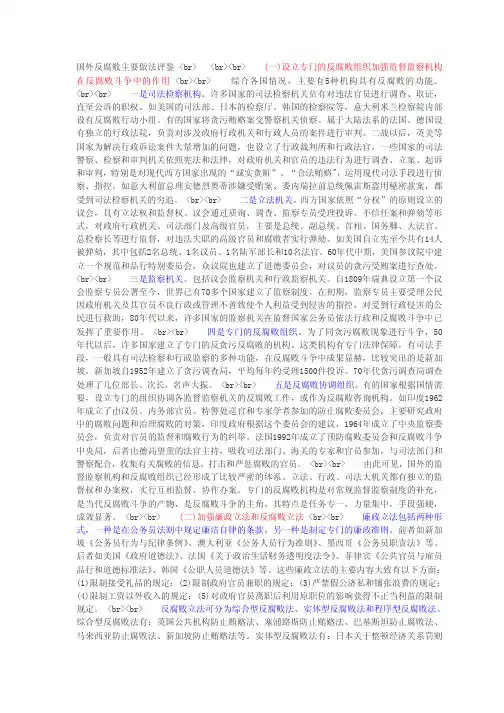
国外反腐败主要做法评鉴<br><br><br>(一)设立专门的反腐败组织加强监督监察机构在反腐败斗争中的作用<br><br>综合各国情况,主要有5种机构具有反腐败的功能。
<br><br>一是司法检察机构。
许多国家的司法检察机关负有对违法官员进行调查、取证,直至公诉的职权。
如美国的司法部、日本的检察厅、韩国的检察院等,意大利米兰检察院内部设有反腐败行动小组。
有的国家将贪污贿赂案交警察机关侦察。
属于大陆法系的法国、德国设有独立的行政法院,负责对涉及政府行政机关和行政人员的案件进行审判。
二战以后,英美等国家为解决行政诉讼案件大量增加的问题,也设立了行政裁判所和行政法官。
一些国家的司法警察、检察和审判机关依照宪法和法律,对政府机关和官员的违法行为进行调查、立案、起诉和审判,特别是对现代西方国家出现的“诚实贪赃”、“合法贿赂",运用现代司法手段进行侦察、指控。
如意大利前总理安德烈奥蒂涉嫌受贿案、委内瑞拉前总统佩雷斯盗用秘密款案,都受到司法检察机关的穷追。
<br><br>二是立法机关。
西方国家依照“分权”的原则设立的议会,具有立法权和监督权。
议会通过质询、调查、监察专员受理投诉、不信任案和弹劾等形式,对政府行政机关、司法部门及高级官员,主要是总统、副总统、首相、国务卿、大法官、总检察长等进行监督,对违法失职的高级官员和腐败者实行弹劾。
如美国自立宪至今共有14人被弹劾,其中包括2名总统、1名议员、1名陆军部长和10名法官。
60年代中期,美国参议院中建立一个规范和品行特别委员会,众议院也建立了道德委员会,对议员的贪污受贿案进行查处。
<br><br>三是监察机关。
包括议会监察机关和行政监察机关。
自1809年瑞典设立第一个议会监察专员公署至今,世界已有70多个国家建立了监察制度。
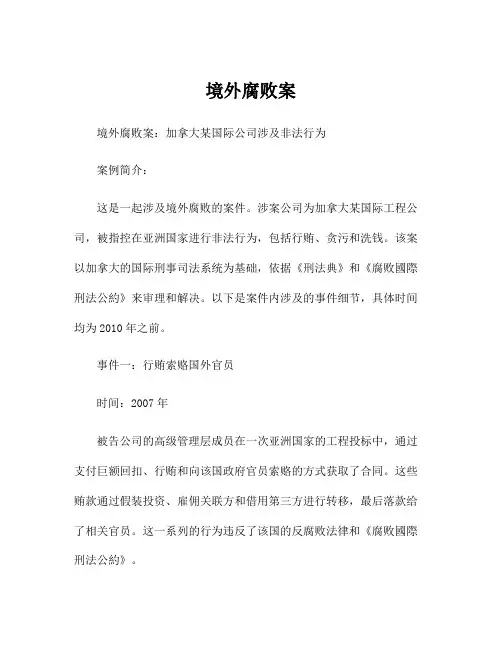
境外腐败案境外腐败案:加拿大某国际公司涉及非法行为案例简介:这是一起涉及境外腐败的案件。
涉案公司为加拿大某国际工程公司,被指控在亚洲国家进行非法行为,包括行贿、贪污和洗钱。
该案以加拿大的国际刑事司法系统为基础,依据《刑法典》和《腐败國際刑法公約》来审理和解决。
以下是案件内涉及的事件细节,具体时间均为2010年之前。
事件一:行贿索赂国外官员时间:2007年被告公司的高级管理层成员在一次亚洲国家的工程投标中,通过支付巨额回扣、行贿和向该国政府官员索赂的方式获取了合同。
这些贿款通过假装投资、雇佣关联方和借用第三方进行转移,最后落款给了相关官员。
这一系列的行为违反了该国的反腐败法律和《腐败國際刑法公約》。
事件二:洗钱时间:2009年被告公司将非法获取的资金进行洗钱,以掩盖其来源。
公司通过虚假合同、转移资金至离岸账户、赌博和购买海外资产等方式,将非法所得变得难以追踪。
这种洗钱行为违反了加拿大的《洗钱和恐怖分子资助活动法》。
律师点评:这起案件体现了跨国公司腐败行为的典型特征。
被告公司通过行贿和洗钱手段,非法获取合同并隐藏非法所得,从而牟取巨额利益。
这不仅破坏了市场公平竞争环境,也损害了当地政府的形象和利益。
根据加拿大国内法和国际公约,涉案公司及相关人员应承担刑事责任。
对于行贿索赂国外官员的行为,应被指控并处以适当的刑罚。
而针对洗钱行为,被告公司的资金流动路径应被追踪,非法资产应予以冻结和追缴。
这起案件对于打击跨国腐败行为具有重要意义。
通过将被告公司及相关人员绳之以法,不仅可以给予受害国家一个公正的赔偿,也能向全球范围内的企业传递一个重要信号:不管在何地进行的非法行为都将受到法律的制裁。
最后,该案例提醒各国政府和国际社会,应加强合作,加大对跨国腐败行为的打击力度。
只有共同努力,才能建立一个更加公平、透明的国际商业环境,维护正常的国际经济秩序。
联合国反腐败公约(中文本)序言本公约缔约国,关注腐败对社会稳定与安全所造成的问题和构成的威胁的严重性,它破坏民主体制和价值观、道德观和正义并危害着可持续发展和法治,并关注腐败同其他形式的犯罪特别是同有组织犯罪和包括洗钱在内的经济犯罪的联系,还关注涉及巨额资产的腐败案件,这类资产可能占国家资源的很大比例,并对这些国家的政治稳定和可持续发展构成威胁,确信腐败已经不再是局部问题,而是一种影响所有社会和经济的跨国现象,因此,开展国际合作预防和控制腐败是至关重要的,并确信需要为有效地预防和打击腐败采取综合性的、多学科的办法,还确信提供技术援助可以在增强国家有效预防和打击腐败的能力方面发挥重要的作用,其中包括通过加强能力和通过机构建设,确信非法获得个人财富特别会对民主体制、国民经济和法治造成损害,决心更加有效地预防、查出和制止非法获得的资产的国际转移,并加强资产追回方面的国际合作,承认在刑事诉讼程序和判决财产权的民事或者行政诉讼程序中遵守正当法律程序的基本原则,铭记预防和根除腐败是所有各国的责任,而且各国应当相互合作,同时应当有公共部门以外的个人和团体的支持和参与,例如民间社会、非政府组织和社区组织的支持和参与,只有这样,这方面的工作才能行之有效,还铭记公共事务和公共财产妥善管理、公平、尽责和法律面前平等各项原则以及维护廉正和提倡拒腐风气的必要性,赞扬预防犯罪和刑事司法委员会和联合国毒品和犯罪问题办事处在预防和打击腐败方面的工作,回顾其他国际和区域组织在这一领域开展的工作,包括非洲联盟、欧洲委员会、海关合作理事会(又称世界海关组织)、欧洲联盟、阿拉伯国家联盟、经济合作与进展组织和美洲国家组织所开展的活动,赞赏地注意到关于预防和打击腐败的各种文书,其中包括:美洲国家组织于1996年3月29日通过的《美洲反腐败公约》、欧洲联盟理事会于 1997年5月26日通过的《冲击涉及欧洲一起体官员或欧洲联盟成员国官员的腐败行为公约》、经济合作与进展组织于1997年11月21日通过的《禁止在国际商业交易中行贿外国公职人员公约》、欧洲委员会部长委员会于1999年1月27日通过的《反腐败刑法公约》、欧洲委员会部长委员会于1999年11月4日通过的《反腐败民法公约》和非洲联盟国家和政府领袖于2003年7月 12日通过的《非洲联盟预防和冲击腐败公约》,欢迎《联合国打击跨国有组织犯罪公约》于 2003年9月29日生效,一致议定如下:第一章总那么第一条宗旨声明本公约的宗旨是:(一)增进和增强各项方法,以便加倍高效而有力地预防和冲击腐败;(二)增进、便利和支持预防和冲击腐败方面的国际合作和技术援助,包括在资产追回方面;(三)提倡廉正、问责制和对公共事务和公共财产的妥帖治理。
反腐败斗争(Anti CorruptionCampaign)反腐败斗争(Anti Corruption Campaign)反腐败斗争(Anti Corruption Campaign) corruption cases are frequently reported by news media. for example, some high ranking officials help themselves to state fund (公款) illegally. for another example, some leaders abuse power (滥用权力). what's more, malpractice(玩忽职守,渎职), bribery (贿赂) and other corrupt behaviour do much harm. as a result, the healthy development of the economy is seriously affected.as china continues its reforms and opens wider to the outside world, anti corruption is a question of priorities. our government has realized the seriousness of corruption problems. corruption presents a dreadful threat to state interests. corruption cases seriously damage efforts to build a clean and honest government, undoubtedly dampen(泼冷水,挫伤) people's enthusiasm(热情) and heavily affect stability(稳定).in the future, to cement (巩固) the fruits that reform has borne, an even greater effort is needed in the battle againstcorrupt behaviour. governments at all levels should take more effective measures to combat corruption. laws already in effect must be strictly enforced (执行). the implementation (实施) of anti corruption programs should target every part of china. anti corruption agencies should intensify crackdown (增强打击力度) on bribery, attach greater importance to the anti corruption campaign.。
反海外腐败法---译本反海外腐败法美国司法部门刑事法庭欺诈局第10街和宪法街,西北部(债券楼第4层)华盛顿20530联系电话:(202) 514-7023传真:(202) 514-7021网址:http:///criminal/fraud/fcpa电子邮箱:********************美国商务部国际商务首席顾问办公室第14街和宪法街,西北部5882 房间华盛顿20230联系电话:(202) 482-0937传真:(202) 482-4076网址:http:///legal简介《1988年贸易法》指示总检察长提供指导有关1977年反海外腐败法司法部的执法政策。
(15 U.S.C.§§78 dd-1)对于潜在的出口商和小型企业这些无法获得专业律师对《反海外腐败法》的相关问题的,对司法部的外国腐败行为法案的意见程序作出回应指导有限。
下面描述和合规职责的一般解释和潜在负债根据《反海外腐败法》。
这个小册子构成司法部《反海外腐败法》的一般解释。
美国公司寻求在国外市场做生意必须熟悉《反海外腐败法》。
总的来说,《反海外腐败法》禁止为获取或保留业务目的贿赂外国官员。
此外,其他法规如邮政电信和网络欺诈的律例,18U.S.C.§1341,1343,和旅行法,18U.S.C.§1952,这些法律条例为联邦提起违反国家商业贿赂法律诉讼提供依据。
司法部是首席执行机构,美国证券交易委员会(SEC)发挥协调作用。
商务部办公室总法律顾问也回答了美国出口商涉及《反海外腐败法》基本要求和约束的一般问题。
这本册子旨在提供《反海外腐败法》的一般描述,并不试图代替私人法律顾问提供关于《反海外腐败法》的相关具体问题的建议。
此外,这份册子中的材料并不打算提出目前司法部和SEC对特定事实情况的执行意图。
背景美国证券交易委员会在1970年代中期的调查显示,400多美国公司承认了有问题或非法支付超过3亿美元的外国政府官员、政界人士和政党。
从贿赂外国高官到为某种有利活动向外国政府寻求保护,也即所谓的便利支付,滥用现象无处不在。
便利支付的存在据称是为了确保政府公务员部长级或牧师的职责免除。
国会颁布了《反海外腐败法》将停止贿赂外国官员和恢复公众信心的美国业务系统的完整性。
话,传真传输,电汇,州际或国际旅行。
此外,发行者和国内法人可能因任何助长腐败贿赂美国以外的国家官员行为承担责任。
因此,美国公司或国立公司可能因雇员授权或完全在美国以外操作的代理商,即利用外国银行账户的钱,没有任何美国参与人员的贿赂承担责任。
1998年之前,外国公司,除了那些可以称得上”发行人”的人,外国侨民不受《反海外腐败法》管制。
1998年修正案扩大了《反海外腐败法》的适用范围至外国公司和国民。
现在外企或个人也属于《反海外腐败法》适用范围,直接或通过代理,助长发生在美国范围内腐败的贿赂行为。
然而,没有要求这样的行为利用美国邮政电信或其他方式或州际贸易的手段。
最后,美国控股公司也可能为他们授权、指导、或控制有问题的活动的外国子公司的行为承担责任,作为美国公民或居民,他们自身是”国内法人”,受雇于或代表外资合并子公司。
B.腐败意图——实施或授权支付的行为人必须有腐败意图,并且支付行为必须故意诱使接受者滥用其职位与支付者或其他人进行不正当交易。
应该注意的是,《反海外腐败法》并不要求腐败行为成功。
提供或承诺腐败支付也可以构成违法。
《反海外腐败法》禁止任何影响该外国官员在其公务职位上的任何行为或决定,引诱该官员做任何违反其法定职责的事情或做对其法定职责不尽责的事情,以获得任何不当的优势,或引诱外国官员利用其在外国政府或其机构的影响力来影响该政府或机构的任何行为或决定,以图帮助该发行者取得或保留给任何人的业务,或将业务指使给任何人。
C.支付——《反海外腐败法》禁止支付,主动提供,承诺支付(或授权支付或提供)金钱或任何有价值的东西。
D.接受者——禁止条款适用于给予外国政府官员、政党或政党官员候选人腐败支付。
外国政府官员意指外国政府。
国际公共组织或其任何部门或代理机构的任何官员或雇员,或以公务地位行事的任何人。
我们应该考虑利用司法部反海外腐败法为特定问题设置的意见程序,就“外国官员”的定义而论,如:无论皇室的一员,立法机构的成员,还是国有企业职员,都被视为”外国官员”。
《反海外腐败法》的条款适用于任何政府官员,不管等级或职位。
《反海外腐败法》的侧重于付款目的而不是收到支付,报价,或付款承诺的特定职位的官员,也有例外的反贿赂条款”促进政府日常行动支付”(见下文)E.商业目的——《反海外腐败法》禁止为了帮助公司获取或保留业务、指导业务而进行的支付。
司法部给出关于”获取或保留业务”广义的解释,这个术语包含含义不仅仅授予或者更新合同。
应该注意的是,获得或保留业务不必与外国政府或外国政府机构有关。
第三方支付《反海外腐败法》禁止通过中介提供腐败支付。
如果知道支付的全部或一部分将直接或间接地给予外国官员,则给第三方提供支付是违法的。
”知道”这一用语包括有意识的漠视和故意的忽视。
抗辩的内容基本上是和上面描述的一样,只是在这种情况下,”接收方”是给必不可少的”外国官员”支付的中介。
中介可能包括合资伙伴或代理。
为了避免承担腐败的第三方支付责任,美国公司尽可能地做了一些尽职调查,并且采取一切必要的预防措施来确保他们已经与有信誉的和合格的合作伙伴和代表之间达成商业关系。
这些尽职调查包括调查潜在的外国代表和合资伙伴以确定它们是否胜任这个职位、与政府是否有个人或专业上的联系,客户群的数量和声誉、他们与美国大使馆或领事馆和与当地银行家/客户/其他商业伙伴的声誉。
此外,在谈判业务关系中,美国公司应该意识到所谓的”特别之处”,即,不寻常的支付模式或财务安排支付,国家腐败的历史,外国合资伙伴或代表提供的拒绝认证,它不会采取任何行动促成一个非法提供、承诺,或支付外国政府官员和不采取任何行动导致美国公司违反《反海外腐败法》,通常是高级专员公署和辖区,在费用和会计记录方面缺乏透明度,在合资伙伴或代表执行提供的服务方面明显缺乏资质或资源,,以及合资伙伴或代表是否已经被官方推荐为政府潜在的客户。
你应该寻求法律顾问的建议,考虑利用司法部反海外腐败法为有关第三方支付特定问题设定的意见程序。
许可的支付和肯定抗辩《反海外腐败法》包含一个明确的例外,禁止为”例行政府行动”支付”便利费”,或提供可以用来抵御涉嫌违反《反海外腐败法》的积极防御。
促进例行政府行动的支付反商业贿赂有一个例外就是例行政府行动的便利性和加速性支付。
”法规列表有以下几个例子:获得许可证,营业执照或其他官方文件,处理政府文件、签证和工作指令等;提供警察保护,邮政电信皮卡和交付,提供电话服务,电力和供水、装卸货物,或保护易腐产品和调度检查与合同相关的性能或跨国家运输货物。
和这些类似的活动也包含在例外之中。
如果对关于支付是否属于例外有问题,可以咨询法律顾问。
同时也应该考虑是否利用司法部门反海外腐败法的意见程序。
“例行政府行动”不适用于给任何外国官员的便利性和加速性支付,如,决定授予新业务或与某一政党继续业务。
肯定抗辩被指控违反《反海外腐败法》的反贿赂条款的人可能会做以下抗辩,根据外国官员所属国的成文法,支付是合法的,或者所花费的钱是用来作为产品或服务的促销、展示或执行合同义务。
在外国成文法规定里,支付是否合法可能很难确定。
我们应该考虑寻求法律顾问的建议,或利用司法部反海外腐败法面对这样一个支付合法性问题的意见程序。
此外,因为这些防御是“积极防御”,要求被告必须在初审时证明支付符合这些要求。
检察方在初审时关于证明不构成这种类型的支付不承担任何责任。
贿赂行为制裁对罪犯的制裁根据《反海外腐败法》反贿赂条款,可能实施的刑事处罚:公司和其他商业实体处以2000000美元以下的罚款,官员、董事、股东、雇员和代理处以100000美元以下的民事罚款和长达五年的监禁。
此外,根据选择性罚金法案的规定,罚金最高可达被告方通过支付腐败付款需求的违法所得的两倍。
对个人判处的罚金不能由其雇主或负责人支付。
对公民的制裁司法部长或美国证券交易委员会可以酌情对任何违反反贿赂条款公司以及官员、董事、雇员、或代理公司或股东代表公司提起民事诉讼,并处以10000美元以下的罚款。
此外,美国证券交易委员会执法行动过程中,法院可以施加额外的罚款不超过(i) 被告由于违法产生的经济收益总额,或(ii)指定的金额限制。
指定的金额限制是基于过分违规,对于自然人来说处以5000美元到100000美元罚款不等,其它人处以50000到500000美元。
只要公司(或官员,董事,雇员,代理人,或者公司的股东代表)违反(或即将违反)反贿赂条款,司法部长或美国证券交易委员会也可以酌情向其提起民事诉讼。
其他政府行为行政管理和预算局颁发的指导方针下,违反《反海外腐败法》的个人或公司可能将被禁止与联邦政府做生意。
单独起诉也可能导致暂停与政府做生意的权利。
总统已指示,如果已被排除、暂停这项权利,或者参与采购,或非采购活动已被排除的任何政党,执行机构不得允许这些政党参与任何采购或非采购活动。
此外,个人或公司被判违反《反海外腐败法》按规定没有资格获得出口许可证,美国证券交易委员会可能暂停或禁止个人证券业务并处以证券业务的民事处罚,美国商品期货交易委员会和美国海外私人投资公司都可能暂停或排除违反了《反海外腐败法》的机构项目,以及违反《反海外腐败法》支付给外国政府官员的费用不能作为业务费用扣除以期减少赋税。
个人行为违反了《反海外腐败法》的反贿赂条款的行为,根据诈骗影响和腐败组织法(RICO) 或根据其他联邦或州法律,由于个人原因也可能导致被罚以三倍的赔偿。
例如,法案也可能被宣称贿赂导致被告赢得海外合同的竞争对手使用作为依据。
政府指导司法部已经设立了反海外腐败法意见程序。
关于任何拟建的商业行为,根据《反海外腐败法》反贿赂条款,美国公司或国民可以要求美国司法部声明目前执行的意图。
意见程序的细节可以28 CFR Part 80找到。
根据这个程序,司法部长将在30天内对个人或公司特定问题调查作出回应。
(30天计时从司法部已收到需要发表意见的所有信息开始)司法部已经颁布了一项意见指出,符合当前政策规定的商业行为,在任何后续的执法行动中,和《反海外腐败法》一致。
关于先前意见发布问题的拷贝版本可在司法部的《反海外腐败法》的网站上看到。
从司法部获取关于《反海外腐败法》和《反海外腐败法》的意见程序的进一步信息,请联系欺诈局副局长查尔斯•杜罗斯,电话是:(202)353 - 7691;副局长纳撒尼尔·埃德蒙兹,电话是(202)307 - 0629;或副局长威廉•斯达克维奇,电话(202)353 - 2393。